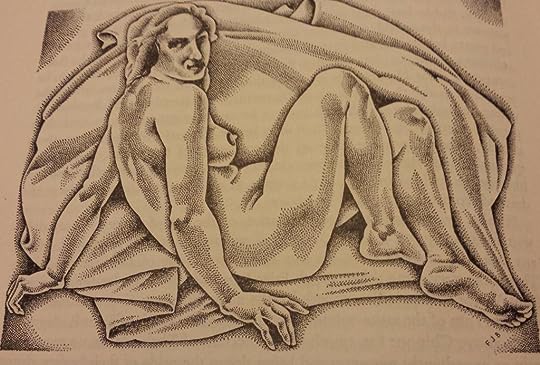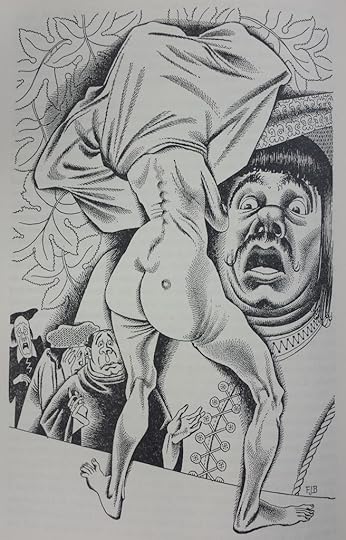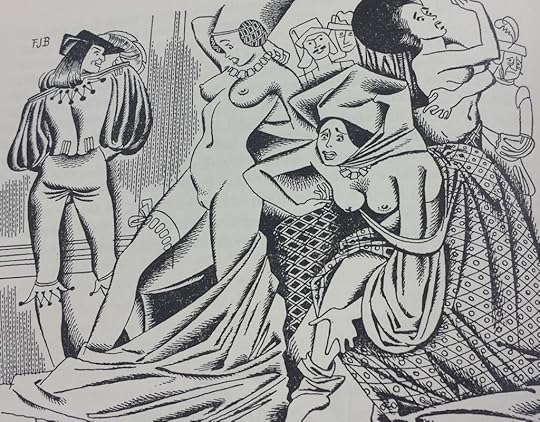What do you think?
Rate this book


623 pages, Paperback
First published January 1, 1532






Rabelais is not to be skipped in literary history as he is a source of so much proverb, story & joke which are derived from him into all modern books in all languages
—Ralph Waldo Emerson
calling them babblers, snaggle-teeth, crazy carrot-heads, scabs, shit-a-beds, boors, sly cheats, lazy louts, fancy fellows, drunkards, braggarts, good-for-nothings, dunderheads, nut-shellers, beggars, sneak-thieves, mincing milksops, apers of their betters, half-wits, gapers, hovel-dwellers, poor fish, cacklers, conceited monkeys, teeth-clatterers, dung-drovers, shitten shepherds, and other such abusive epithets.
But what harm had poor I done? cried Trudon, hiding his left eye with his kerchief, and showing his tabour cracked on one side: they were not satisfied with thus poaching, black and blueing, and morrambouzevezengouzequoquemorgasacbaquevezinemaffreliding my poor eyes, but they have also broke my harmless drum.
One of the querries, who, hopping and halting like a mumping cripple, mimicked the good limping Lord de la Roche Posay, directed his discourse to the bum with the pouting jaw, and told him, What, Mr Manhound, was it not enough thus to have morecrocastebezasteverestegrigeligoscopapopondrillated us all in our upper members with your botched mittens, but you must also apply such moderegripippiatabirofreluchamburelurecaquelurintimpaniments on our shinbones with the hard tops and extremities of your cobbled shoes.
(p 541)
‘The candour which scintillates from the circumference of your minds fully convinces me of the virtue hidden within their ventricles; and, having noted the mellifluous suavity of your eloquent courtesies, I am readily persuaded that your heart suffers no vitiation nor any paucity of deep and liberal learning but abounds rather in several peregrine and rare disciplines which nowadays (because of the common practices of the imperite mob) are more easily sought than caught.
‘That explains why I, who have in the past overmastered any private emotions, cannot now restrain myself from uttering to you the most trite words in the world, namely: Be ye welcome, most welcome, most utterly welcome.’
So enjoy yourselves my loves happily reading what follows for your bodily comfort and the good of your loins. Listen now, you ass-pizzles. May ulcers give you gammy legs: and remember to drink a toast back to me! And I shall pledge you double quick.A note, to begin, on this particular edition (the Penguin Classics translation by M. A. Screech). There are two things found here that I particularly liked: first, where applicable, Screech has managed to intuitively provide the text from the original version of G&P as well as the additions and omissions from the later definitive version. He does this mostly with the text itself, with some minor footnoting as well. It was easy to follow, and I loved the additional insight to the textual differences. And, second - and this was particularly wonderful - he provides an introduction to each chapter, providing background and references up front. In this manner he keeps the amount of footnotes to a minimum, while still catering to the lay reader. This is greatly facilitated by the very short chapters of the text, but I still wish I would see this method used more frequently, as I vastly prefer it to having to bounce back and forth checking footnotes (or, even worse, endnotes).
